What is the Full Form of NEPNEP: National Education PolicyNEP stands for National Education Policy. The 2020 National Education Policy aims for India's future educational system. It is described in the National Education Policy of India 2020 (NEP 2020), which the Indian Union Cabinet adopted on July 29, 2020. In rural and urban India, the Policy provides a complete framework for education from early childhood through higher education. It also covers vocational training. By 2030, the strategy wants to overhaul India's educational system completely. 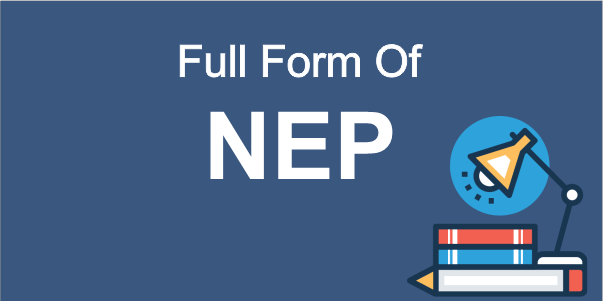
The administration quickly stressed that no one would be forced to study any particular language and that they would not replace English with any regional language as the teaching language. The NEP's language policy is a general guideline and advisory that the states, organizations, and schools must determine how to implement it. India's Concurrent List includes the subject of education. BackgroundThe National Policy on Education from 1986 has been replaced with the NEP 2020. A group led by former Cabinet Secretary T. S. R. Subramanian began the New Education Policy consultation process in January 2015. Based on the committee's report from June 2017, a team under the direction of former Indian Space Research Organization (ISRO) director Krishnaswamy Kasturirangan presented the draught NEP in 2019. The 484-page Draft NEP was long. Later, the Ministry of Human Resource Development produced the Draft New Education Policy (DNEP) 2019, the subject of several public discussions. The Ministry conducted a thorough consultation process. "Over two lakh proposals from 2.5 lakh gramme panchayats, 6,600 blocks, 6,000 Urban Local Bodies (ULBs), and 676 districts were received during the formulation of the draught policy process," reads the statement. ProvisionsNumerous reforms to India's education policy have been implemented under the NEP 2020. It aspires to raise public spending on education from about 3% of the GDP to 6%. LanguagesThere are many origins in India. The use of the mother tongue or local language as the medium of teaching until Class 5 has been "emphasized" by the National Education Policy 2020 recommends that it be kept up until Class 8 and beyond. Foreign languages and Sanskrit will also be highlighted. According to the Policy's suggested "formula," every kid should study three languages in school. Additionally, it declares that kids won't be forced to learn a language. 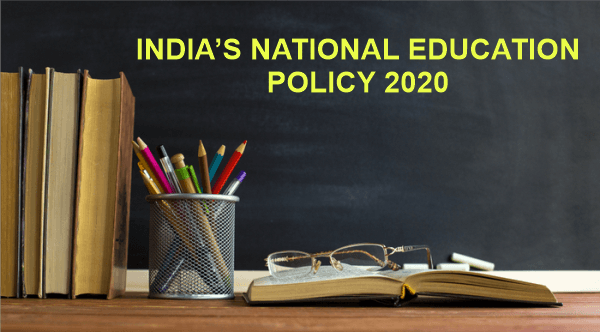
The government quickly stressed that the language policy in NEP is only a general guideline and that it is up to the governments, institutions, and schools to determine how to apply it. They also pointed out that several institutions, including Sardar Patel Vidyalaya, had adopted this language policy 60 years prior. The Education Act supported using the mother tongue as a recommendation. The National Curriculum Framework will be issued in 2021 and include a more comprehensive language plan. Education In SchoolsFoundational Literacy and NumeracyThe Policy places the highest priority on these skills. The goal is for all pupils to master fundamental literacy and math skills by grade 3. According to the policy, achieving universal basic reading and numeracy in primary school by 2025 would be the top objective of the educational system. Once the kid completes this fundamental learning need (i.e., reading, writing, and math at the foundational level), the remaining provisions of this policy apply to them. Consequently, all State/UT governments will create an implementation plan for use in all primary schools that outlines specific objectives and targets that must be met by 2025 and keeps close tabs on how well the plan is being carried out. 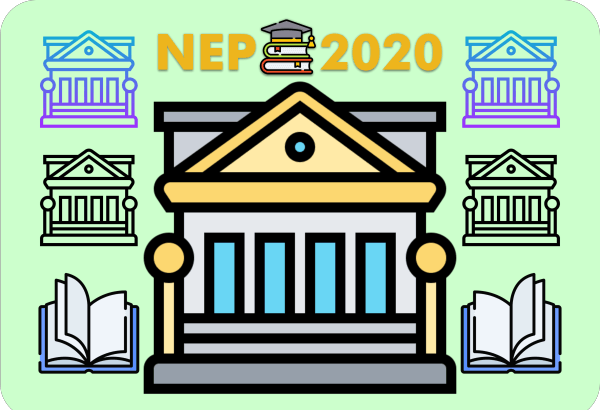
For the advancement of the same to do this, the NIPUN Bharat Mission was introduced on July 5, 2021. The "10+2" model will take place instead of the "5+3+3+4" structure. They will do this in the following way: Foundational StageActivity-based education will be the main focus of the analyses. This is separated into classes 1 and 2 in primary school, followed by 3 years of preschool or Anganwadi. This will devote to children between the years of 3 and 8. The preparatory stage from classes 3 to 5 will be for students between the ages of 8 and 10. All the subjects will be gradually introduced. Classes 6 to 8 in the middle stage are for kids between 11 and 13. They will instruct pupils in more conceptual notions. Secondary StageClasses from ninth to twelfth range from 14 to 18. These four years of education instill multidisciplinary study, depth, and critical thinking. This time, it is split into two areas. For grades 10 and 12, board examinations will still be given, although they will revise them. The standards for this Measuring Performance, Evaluation, and Assessment of Learning for Integrative Education are determined by a grading organization called PAREKH. These examinations are simpler because they are administered twice a year, and pupils would have a maximum of two chances to pass. The actual test would be divided into two sections: the objective and the descriptive. 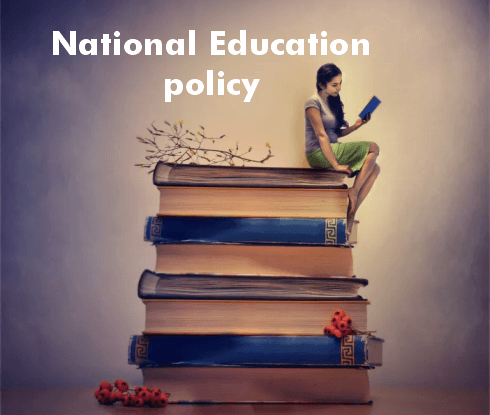
This strategy intends to lighten students' academic loads and enable them to become more "interdisciplinary" and "multilingual." One of the examples offered was, "Students will be free to combine chemistry and physics to study baking or pursue fashion studies." Report cards will include information about the student's abilities and be "holistic." From sixth grade onward, they will teach coding and utilize practical learning. Through counselors and social workers, more attention will be paid to students' health, particularly their mental health. Higher LearningIt suggests a 4-year undergraduate curriculum leading to a multidisciplinary bachelor's degree with various exit alternatives. These will be implemented as follows, and they will encompass professional and vocational fields:
The discontinuation of MPhil (Master of Philosophy) programs will bring degree education aligned with Western standards. India will establish the Higher Education Commission of India (HECI) to oversee higher education. Gross enrolment ratio growth will be the council's main objective. There will be 4 verticals in the HECI:
The extra PCBs would include professional organizations like the Council of Architecture, the National Council for Vocational Education and Training, the Indian Council of Agricultural Research, and the Veterinary Council of India. The National Testing Agency will now conduct admission tests for enrolment in national universities in addition to the JEE Main and NEET. The policy suggests that institutions of higher learning, like the IITs, make adjustments concerning the variety of learning. The proposal is to internationalize Indian education. Indian institutions can now establish campuses abroad. The tuition for both public and private colleges will be set. Campuses with International BranchesExplicitly enabling foreign institutions to build campuses in India and granting authority for IITs to create campuses abroad, the NEP 2020 revived the drive to import international branch campuses after an earlier attempt in 2012 that was unsuccessful. The idea of importing higher education institutions from other nations to position the nation as a global educator has been contested by academics. India's Vice President, M. Venkaiah Naidu, voiced a desire to strengthen India to attract international academic talent. The approach uses global education to rebuild India as a Vishwa Guru (or world teachers). TeachersMany policy reforms regarding teachers and teacher education are proposed in the NEP 2020. They will need a minimum 4-year Bachelor of Education degree to become a teacher by 2030. The recruiting process for teachers will also be enhanced and made more transparent. The National Council will frame a plan for Teacher Education. By 2022, a national curricular framework for teacher education will be accessible, along with National Professional Standards for Teachers. EdTechNEP 2020 gives EdTech entrepreneurs and enterprises the direction and encouragement they need to create learning management systems, ERP software, assessment platforms, online laboratories, etc., for colleges and universities. An independent organization, the National Educational Technology Forum (NETF), was established to promote discussion on how to use technology to enhance learning. According to NEP, NITI Aayog teamed up with Byjus in September 2021 to offer free access for engineering hopefuls from 112 districts to its tech-driven learning programs. Other AdjustmentsNumerous new educational institutions, organizations, and ideas have been given legal authorization to organize as part of NEP 2020. These consist of the following:
The Indian Institute of Translation and Interpretation is among the planned language institutes. Other organizations have been mentioned, such as the National Book Promotion Policy and the National Mission on Foundational Literacy and Numeracy. 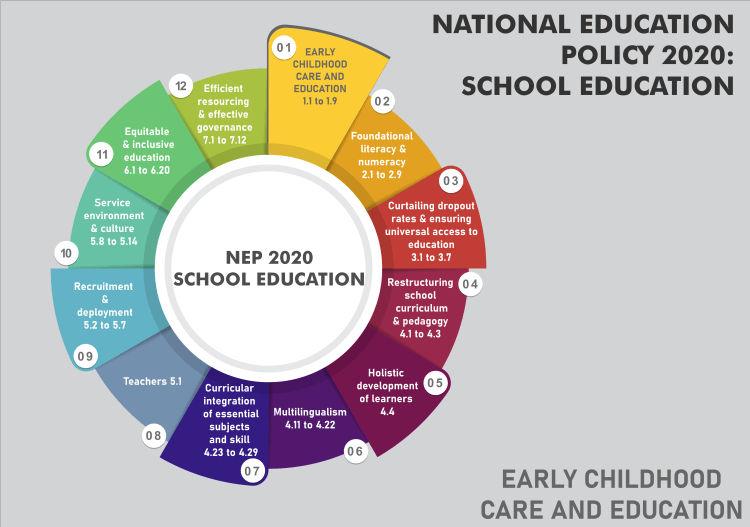
ReceptionNational Education Policy's (NEP) drafting panel head Krishnaswamy Kasturirangan remarked, "There are no language restrictions. The new NEP 2020 continues to be built on multilingual flexibility ". According to the UGC and educators, students should know the rules. According to Prime Minister Narendra Modi, the strategy emphasizes "how to think" rather than "what to think." The Indian Vice President, Venkaiah Naidu, praised the Policy's adaptability to bringing out-of-school kids into the educational system and lowering dropout rates as its loftier objective. In contrast, Najma Akhtar, the vice-chancellor of Jamia Milia Islamia, described it as "ground-breaking." Dinesh Singh, former vice-chancellor of Delhi University, stated that "the policy spells out the route map very clearly." Shashi Tharoor, a Lok Sabha member and the head of the Congress, praised the move but expressed his reservations about how they will carry it out. The Observer Research Foundation reported the same thing. According to Dhiraj Kumar Nite from Ambedkar University Delhi, discontinuing the MPhil program was inconsistent with the NEP's guiding principles since several departure points were available for undergraduate students. Still, there would be no fast escape for those who wanted to pursue a Ph.D. In light of the COVID-19 epidemic in India, the JNU Student's Union (JNUSU) and Delhi University Teachers Association condemned the government for accepting the Policy since its first formulation. 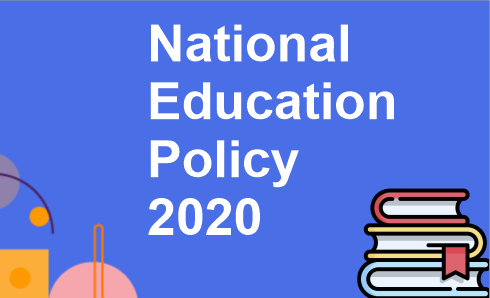
Sitaram Yechury, the head of the CPI(M), said that academic proposals had not been considered, and the party's politburo decried the Policy's promotion of commercialization. M. K. Stalin, the president of the DMK, said that the Policy would harm Tamil since Sanskrit was made an "obligatory" choice at every educational level and that it was enacted without debate in the Parliament. JNUSU's Aishe Ghosh tweeted that the Policy's use of internships would result in child labour. There were many issues with the 2019 Draft NEP. Hindi is taught in schools in the south Indian states sparked a social media backlash. According to the Student's Federation of India, this compromises autonomous research and undermines the federal nature of the educational system. It also commercializes education. According to Frontline's Madhu Prasad, the draft's merit-based college admissions standards did not consider reservations or the caste-based oppression and prejudice many people in the country experience. Although DP Sharma praised the idea of transforming the Indian education system, he conveyed his worry regarding the careful and honest implementation of the present endeavor to change the Indian educational system completely. He acknowledged the objective of building a self-sufficient Indian transformation in education. Undergraduate programs with many departure options provide institutions the legal right to stop monitoring students who leave because of socioeconomic constraints and to treat such cases as individual choices instead. The emphasis on a "mode-for-instruction" framework centered on vocational training and skilling for the general public and better "mode-for-learning" reserved for the fortunate handful of people through private universities, which are excluded from regulations related to affirmative action which has been perceived as favoring teachers from private edtech industries over academic professors and web modules over classroom teaching. ImplementationKarnataka was the first State to release an order about the implementation of NEP at the beginning of August 2021. Madhya Pradesh implemented NEP 2020 on August 26, 2021. Yogi Adityanath, the chief minister of Uttar Pradesh, declared that the National Education Policy 2020 would be implemented gradually by 2022. The recently announced (NEP 2020) would be implemented in Telangana State, according to the state government. Uddhav Thackeray, the chief minister of Maharashtra, orders the creation of an expert committee to carry out the new education strategy. The Chief Minister of Andhra Pradesh, Y.S. Jagan Mohan Reddy, has instructed representatives of the Education Department to execute the National Education Policy 2020 across the State in letter and spirit. Governor of Rajasthan Kalraj Mishra stated that NEP 2020 would be implemented in stages. According to Himanta Biswa Sarma, the Chief Minister of Assam, NEP 2020 would go into effect on April 1, 2022. The UGC (University Grants Commission) granted concurrent dual degrees in both the physical and online modalities in April 2022.
Next TopicFull Form
|
 For Videos Join Our Youtube Channel: Join Now
For Videos Join Our Youtube Channel: Join Now
Feedback
- Send your Feedback to [email protected]
Help Others, Please Share










